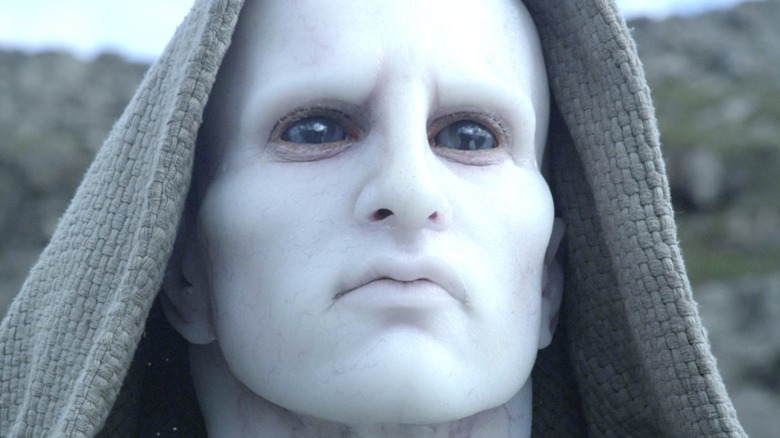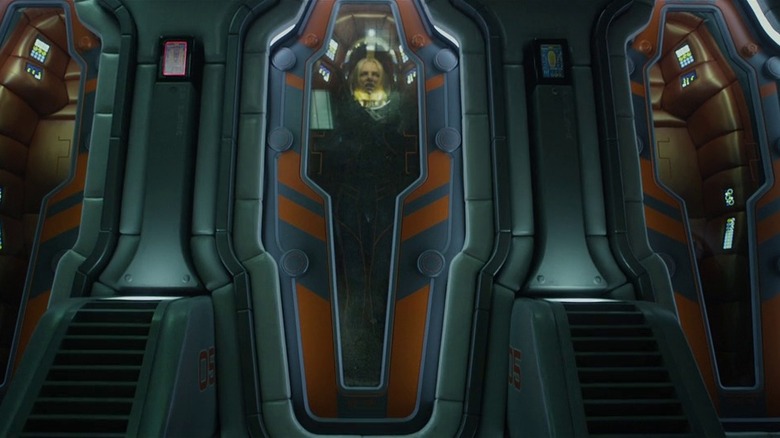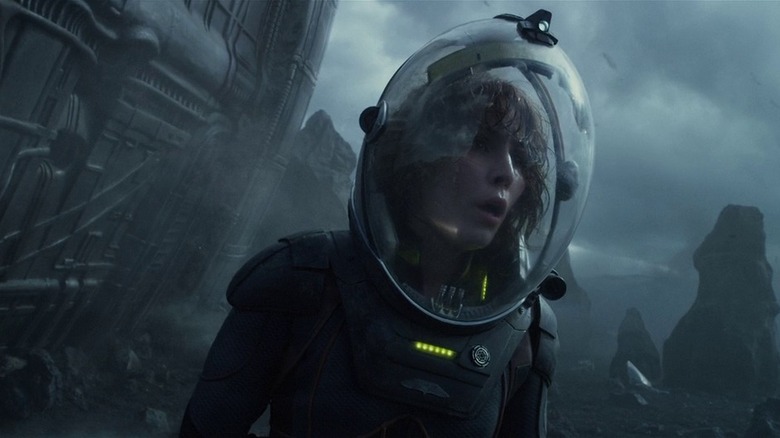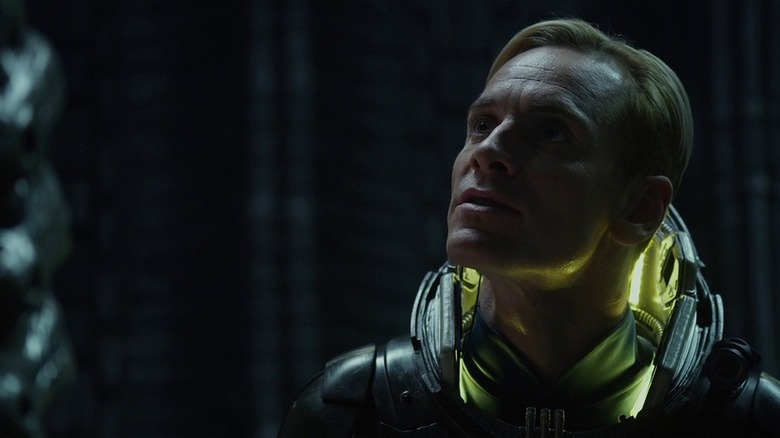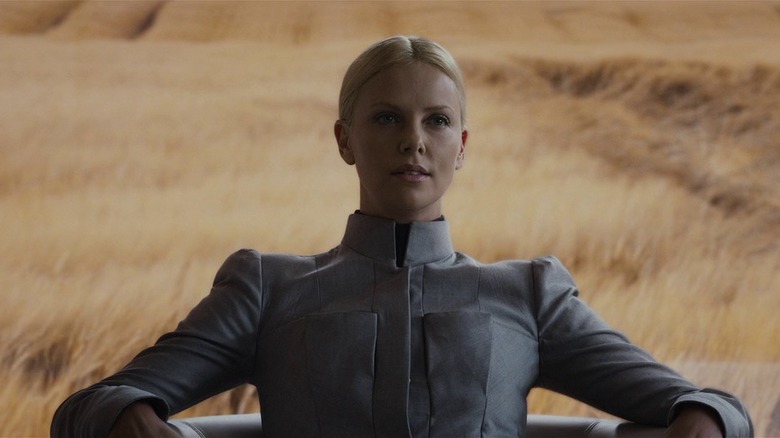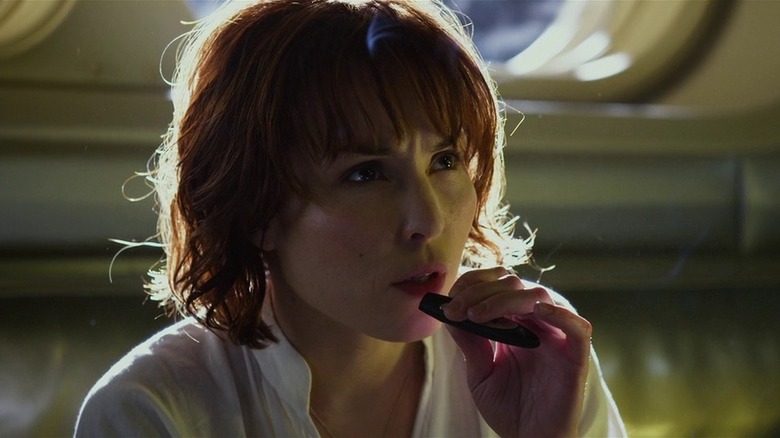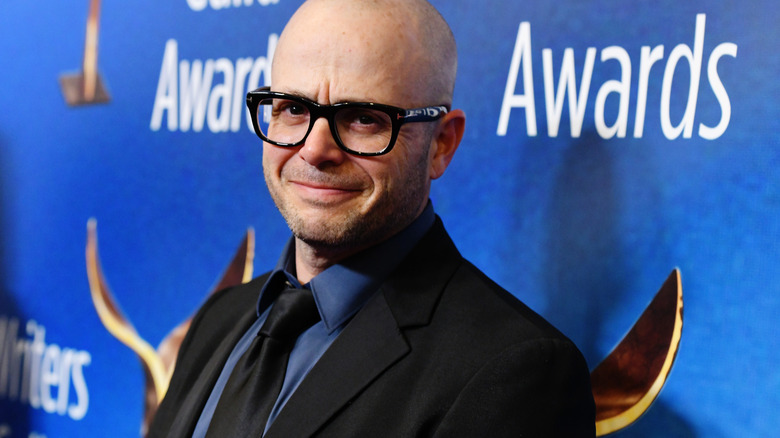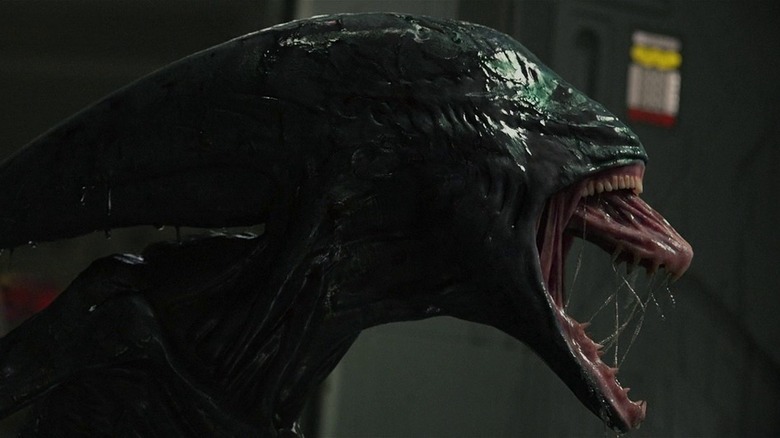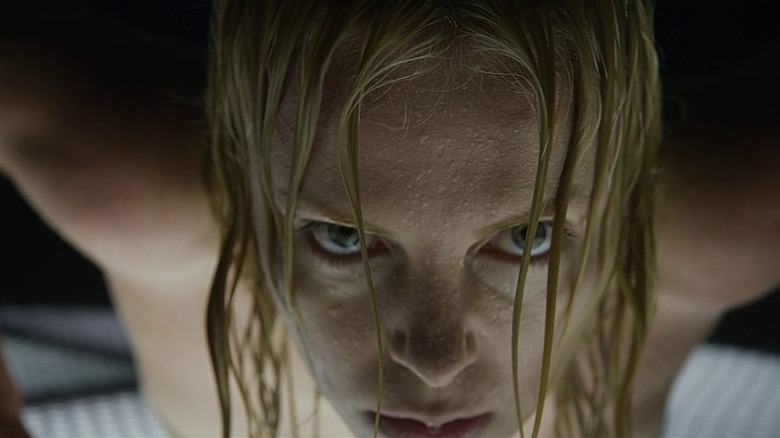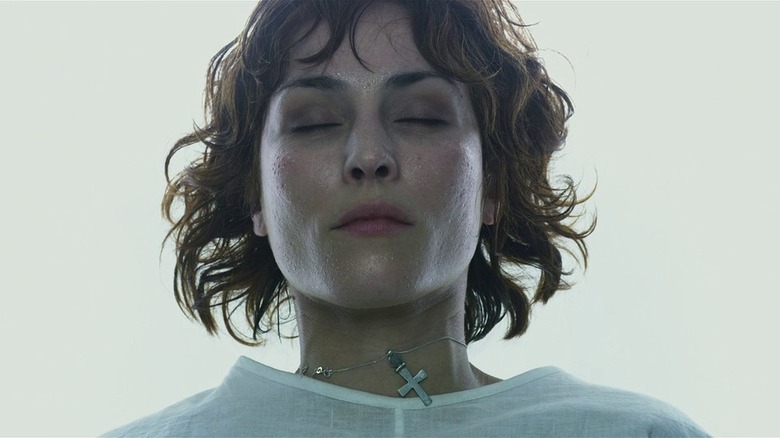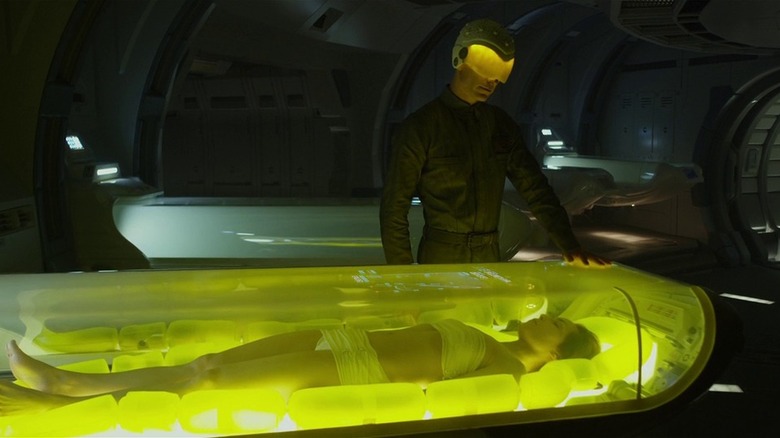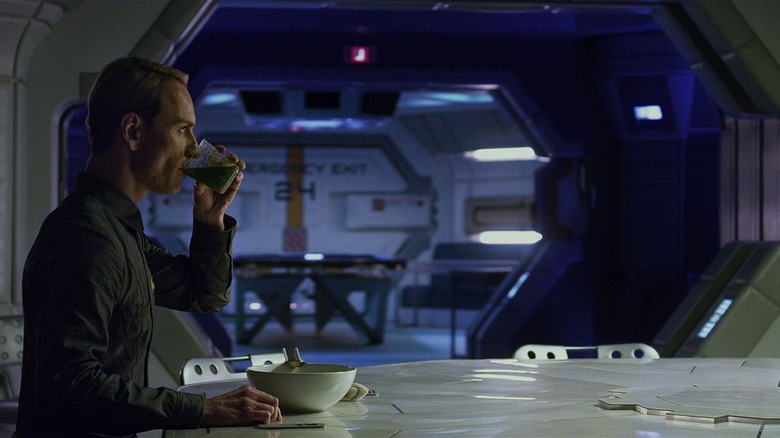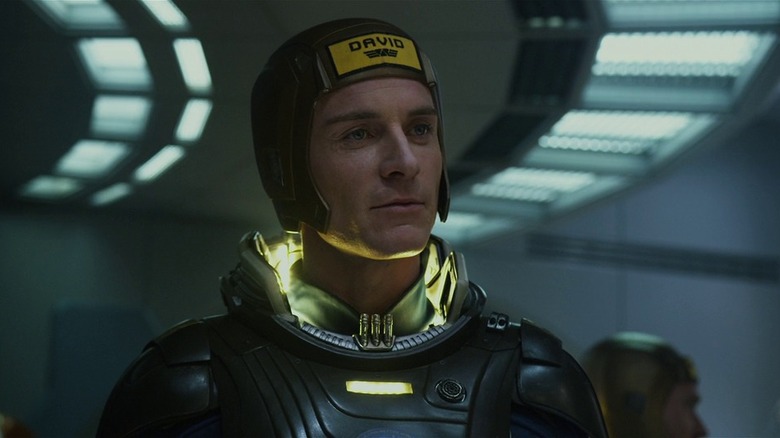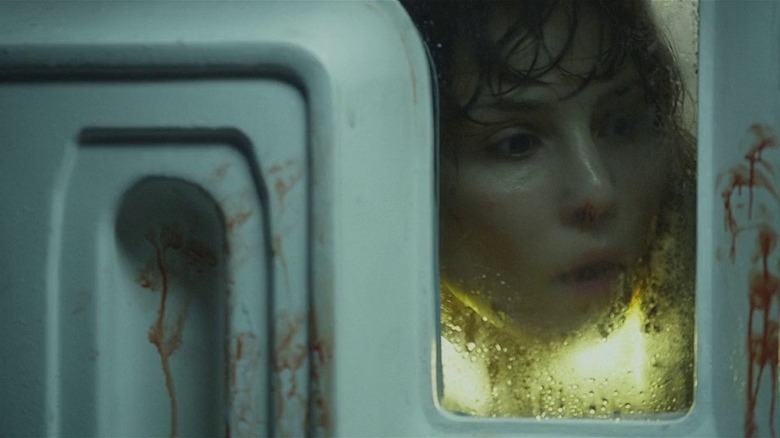The Untold Truth Of Prometheus
In 2012, the "Alien" franchise returned in a bold new form with the feature film "Prometheus." Ellen Ripley was nowhere to be seen, and the xenomorph aliens were relegated to a final epilogue largely separate from the rest of the film. However, the vibes, visual aesthetic, and even archetypes found in the narrative resonated as familiar for devotees to this saga. "Prometheus" ended up scoring a largely positive but nonetheless divisive reputation, ensuring that it has stuck around in the pop culture conversation for years after its initial theatrical run. However, even with all the discourse that has surrounded its existence, there's still so much about "Prometheus" that has remained obscure even to the most hardcore "Alien" aficionados.
Details like how long Ridley Scott had been nursing ambitions to deliver an "Alien" prequel, the process for casting the film's lead, and screenwriter Damon Lindelof's resistance to the very idea of prequels, among other elements, aren't common knowledge. But they're integral to understanding the creative process that birthed "Prometheus." The untold truth of this unorthodox entry in the "Alien" mythos can maybe provide answers to some long-simmering questions fans have been harboring about "Prometheus" for years.
Ridley Scott was interested in an Alien prequel since 2002
While "Prometheus" wouldn't hit movie theaters until June 2012, the concept of an "Alien" prequel helmed by director Ridley Scott had been around long before then. In March 2002, IGN reported on a variety of then-recent comments Scott had made about doing more "Alien" movies. He was intrigued by the idea of doing a standard follow-up to "Alien: Resurrection," but he also had a notion for doing an "Alien" prequel. For Scott, this wouldn't just be a movie set before "Alien," but a tale that would examine where the nefarious otherworldly beasts at the heart of this franchise came from.
While Scott had a passion for an "Alien" prequel even then, it would take years for this desire to manifest in a completed movie. Part of this was due to 20th Century Fox's alternate ideas for where to take the "Alien" movies. In 2006, James Cameron divulged in an interview with Ain't It Cool News that he and Scott had been working on ideas for a fifth "Alien" movie but Fox had opted to pursue "Alien vs. Predator" instead. Despite neither Scott nor Cameron having any interest in that other project, "Alien vs. Predator" charged on and eventually spawned a 2007 sequel. It was only after that follow-up did Scott and Fox resume talks over what would eventually become "Prometheus."
Carl Rinsch was the first choice to helm Prometheus
Part of the appeal of "Prometheus" for "Alien" fans was that Ridley Scott would be returning to direct an installment in this franchise. Having helmed the initial "Alien" film in 1979, Scott had no involvement in subsequent entries in the saga. For decades, Scott's shadow lingered large over the franchise, but his actual creative presence was nonexistent. While that would change with "Prometheus," Scott was once again initially planning to sit on the sidelines and not direct this entry. Instead, he had an idea for someone entirely new who could take over filmmaking duties.
This role would instead have gone to commercials director Carl Rinsch, who, at this point, had never directed a feature film. Scott was enthusiastic about the filmmaker (who was also romantically linked to Scott's daughter Jordan), but 20th Century Fox was far less enamored with this idea. The studio was hesitant to hand off an expensive property to a director who had never helmed a feature film and instead wanted Scott to direct "Prometheus." Scott's commitment to Rinsch was so strong that "Prometheus" was almost killed solely because Scott didn't want the film to get made if Rinsch wasn't helming it. In the end, the problems would get ironed out and Scott would direct "Prometheus," while Rinsch would get his chance to helm a would-be blockbuster with "47 Ronin," which turned out to be a flop of epic proportions.
Jon Spaihts and his experience writing Prometheus
Screenwriter Jon Spaihts never could have imagined he would end up writing an "Alien" prequel. As he explained to Forbes, he never even contemplated what had taken place before the events of the original "Alien" until he had a meal with Ridley Scott, where the filmmaker inquired what he thought happened in this timeframe. However, once he was asked, Spaihts began to come up with new ideas, including a narrative "bridge" that would tie together the "Alien" movies with what would eventually become "Prometheus." This stream of imaginative consciousness did the trick. Scott offered Spaihts the job to write "Prometheus," making him the first writer to pen an official script for the project.
From there, Spaihts began penning multiple drafts of the screenplay, with the story being largely informed by unique visuals that Scott would come up with. Though Spaihts noted that he had to challenge some of Scott's concepts for the good of the entire film, he also said that some of the director's suggestions made the film much stronger on a narrative level. Spaihts also tried to maintain a tangible level of humanity in any new narrative direction "Prometheus" traveled down, all in the hopes of getting audiences as excited about this world as Spaihts was at that fateful meeting with Scott.
Ridley Scott filmed in digital 3D for the first time
"Prometheus" crashed into movie theaters in June 2012, roughly two-and-a-half years after "Avatar" forever changed digital 3D. After that James Cameron movie premiered, everybody was rushing to deliver the next film that could benefit, both financially and creatively, from the fascination moviegoers had with this format. Among such titles was "Prometheus," a film that served as director Ridley Scott's first foray into the digital 3D medium. Though he was new to this format of filmmaking, it didn't take long for Scott to equip himself with the unique tools at his disposal.
Talking to Total Film, Scott explained that he found it easy to adjust to filming in digital 3D because he was already a very visual filmmaker. He did note that he wanted to make sure that the use of digital 3D in "Prometheus" wasn't a gimmick used just for cheap shots of objects hurtling at the screen. Instead, he wanted it to accentuate the atmosphere and tension of the story. He was also impressed with the cameras used to capture footage in 3D, with Scott being especially enamored with how "you can literally, as it were, twiddle a knob, and the depth will increase." Having these tools at his disposal made jumping into digital 3D filmmaking an exciting rather than daunting prospect for the legendary director.
Finding a leading lady for Prometheus
Since "Prometheus" was going to use an entirely new cast compared to past "Alien" movies, that meant fresh actors would need to be hired. This included the film's protagonist, Dr. Shaw, a role that would eventually go to Noomi Rapace. Hot off her work in the lead role of the original Swedish version of "The Girl With The Dragon Tattoo" and its sequels, Rapace had the chops and notoriety needed to anchor a big blockbuster from director Ridley Scott. However, despite being a fine fit for the role, she wasn't initially the first choice for the part.
When "Prometheus" was first announced, a name connected to the lead role was Natalie Portman, who was in the middle of garnering buzz for her work in "Black Swan." When that didn't pan out, Anne Hathaway was later said to be in contention for the role, while Carey Mulligan and Abbie Cornish were later named as frontrunners. However, Rapace would eventually secure the role, beating out bigger names for such a highly coveted job.
Damon Lindelof insisted that Prometheus not be a straight prequel
Prequels aren't always bad, but, fairly or not, they've garnered a divisive reputation. Movies like the "Star Wars" prequels and "Dumb and Dumberer: When Harry Met Lloyd" have given the concept of prequels a dim name. It's understandable, then, that filmmakers and writers in charge of making new prequels would be conscious of the trappings of earlier films of this kind and avoid the failings that torpedoed those. This was partially why "Prometheus" screenwriter Damon Lindelof has constantly talked about his desire to ensure that "Prometheus" wasn't a standard prequel.
Talking to The Hollywood Reporter, Lindelof was frank in saying that he had an inherent issue with prequels in that "there's an inevitability" in such projects: they can end up "just connecting dots" rather than telling exciting standalone stories. Conscious of this, Lindelof rewrote the "Prometheus" screenplay so that any explicit traces of the "Alien" franchise would be pushed to the very end of the movie and the focus would go on newer elements, like Michael Fassbender's android character David. Going in this direction didn't necessarily guarantee the kind of "Alien" prequel studio executives may love, but it did ensure that Lindelof worked on something that was exciting to him and had the potential to avoid the traps so many other prequels fell into.
How Lindelof approached writing the ending
While "Prometheus" technically functions as a prequel to "Alien," the proper ending to the story does not involve the sudden arrival of Ellen Ripley. Instead, Dr. Shaw hops aboard a spaceship with the head of android David inside and, in voice-over, explains that she's now heading towards the planet her creators called home. She isn't sure what she'll find out there, but she hopes to finally get some answers on where she came from. It's a conclusion that continues the philosophical underpinnings of "Prometheus" rather than barreling straight ahead into the world of "Alien," though an epilogue showing the birth of a xenomorph will certainly satisfy people wanting a tip of the hat to those earlier films.
Screenwriter Damon Lindelof explained to MTV that the ending to "Prometheus" was always tricky to navigate. As he put it, the writers had to make sure that "Prometheus" functioned as its own standalone movie — it could not be something that acted like follow-ups were a foregone conclusion. However, he also said that everyone involved agreed that it couldn't feel like the first scene of "Alien" would start right up the moment "Prometheus" ended. He also noted that the ending's lack of concrete answers to lingering questions about the world of "Prometheus" was intentional, a byproduct of how everyone involved wanted to leave audiences thinking, not just walking away with "Alien" lore.
Charlize Theron's original Prometheus role
While Charlize Theron has a sizable part as a villain and some great lines in "Prometheus," she was originally approached to play the lead role of Dr. Shaw. Though it's easy to see why everyone involved with "Prometheus" would want an Oscar-winning performer of Theron's caliber to anchor a big blockbuster, it was never meant to be. Theron ended up turning down the role due to scheduling conflicts with her multitude of other projects.
However, when one door closes, another one opens, as they say. In this case, losing out on Dr. Shaw allowed Theron to portray the malevolent Meredith Vickers in the film. Interestingly, this wasn't a part that was just handed over to Theron on a silver platter. She managed to beat out other major names for the part, most notably Angelina Jolie, while taking on the antagonistic Vickers put her in direct opposition with her original "Prometheus" role. Only a performer as good as Theron could have no trouble alternating between getting offered the protagonist and antagonist of the same movie.
The scene that guaranteed Prometheus an R rating
While the 2004 film "Alien vs. Predator" secured a PG-13 rating, the "Alien" franchise has otherwise been exclusively an R-rated space. It's the kind of rating you need if you're going to properly render cosmic horror stemming from beings that can pop out of your chest without warning or gruesomely dismember human victims. However, before the release of "Prometheus," there was a question of whether or not it would get slapped with an R or have to settle for a PG-13 rating. The cinematic landscape had changed dramatically since the original "Alien" and a PG-13 was now seen as essential for box office glory.
In the end, "Prometheus" managed to score an R rating, largely due to one scene. Per The Los Angeles Times, a sequence where Dr. Shaw extracts an alien creature from her gut in an emergency C-section was deemed too graphic for a PG-13 rating. Since this is a pretty important moment in the story, cutting it to achieve a more broadly appealing rating would have jeopardized "Prometheus" as a movie. The sequence stayed in, and the movie's R rating was assured. While not the only aspect of "Prometheus" that would have proven hard to smuggle into a PG-13 feature, this surgery sequence proved to be the deciding factor in ensuring "Prometheus" upheld the MPAA rating tradition of its predecessors.
The use of practical sets on Prometheus
In the 1970s, when the original "Alien" was filmed, the idea of shooting against green screen and adding entirely digital backdrops later was a concept as alien as the xenomorphs themselves. This meant that the world of "Alien" was rendered with astonishing practical environments that can still dazzle moviegoers today, with the tactility of these backdrops making the horrifying events of the film extra potent. When it came time for director Ridley Scott to return to the "Alien" universe with "Prometheus," it was always likely that he would also resurrect the franchise's dedication to practically realized sets.
Charlize Theron told ScreenRant just how extensive the practical sets in the film were. The entirety of a spaceship, rather than just one or two rooms, was built out, while green screen was only restricted to windows showing the surface of the alien planet. Theron noted that the dedication to giving actors something real to react to even extended to the computer monitors she and other performers looked at. Rather than being covered in green screen, these monitors had pre-loaded CGI sequences playing on them, further enhancing the realism of the film. With these precise details in place, "Prometheus" could inject something real into the shooting of a fantastical sci-fi film, much like "Alien" decades earlier.
How Michael Fassbender approached playing an android
Actors playing robots have a typical rulebook to follow, especially on a physical level. Your movements can't be super varied or over-the-top; there has to be a sense of stiffness to the slightest tweak of your body. You also typically have to convey an aura that's almost human but not quite, and there has to be a subtle uncanny valley vibe of being so close to being a person but not. Yet several actors have excelled in their robot performances because they deviate from expectations. So it was with Michael Fassbender as the scheming and unpredictable android David, a character that Fassbender knew would be made or upended by how he portrayed him physically.
Speaking to SlashFilm, Fassbender noted that his performance of David was not based on any of the androids from earlier "Alien" installments. Instead, he took inspiration from the replicants in "Blade Runner" as well as David Bowie from "The Man Who Fell to Earth," among other performances. Most importantly, Fassbender incorporated small details in the physicality of his performance, namely how David shifts to "leaning on [his] hip" towards the end of the movie to reflect his altered state of loyalty to his human masters. It was tiny touches like that, as well as the movies Fassbender took cues from, that ensured he followed in the footsteps of other classic robot performances without just being a carbon copy of them.
Fans wondered whether or not Prometheus was a prequel
Before its release, there was a lot of internet chatter about what exactly "Prometheus" was. Once said to be a reboot and prequel to the "Alien" saga, it was eventually referred to as something largely original with only tangential connections to the "Alien" franchise. This conflicted with key elements of the lead-up to the feature's release, including comments from its cast members and even its own teaser trailer, a homage to the trailer for the very first "Alien." While the eventual film would make it clear in an epilogue that this was indeed firmly set in the same universe as Ellen Ripley and friends, for the longest time uncertainty hung over whether or not "Prometheus" was truly an "Alien" movie.
Talking to Entertainment Weekly, screenwriter Damon Lindelof noted that one reason a sense of mystery was preserved about the status of "Prometheus" was to ensure that the film would offer some surprises for moviegoers when they actually watched it in a theater. Similarly important was a desire to make sure that "Prometheus" could stand on its own two feet rather than just coast on the profile and reputation of "Alien." He also remarked that part of the evolving discussion over the film's relationship to the "Alien" saga came about because the first draft of the "Prometheus" script was much more directly tied into the "Alien" mythos than the film's final cut.
The viral marketing of Prometheus
The theatrical premiere of "Prometheus" was promoted, in part, by a series of viral videos meant to put the title on the radar of general moviegoers in a unique way. As noted by TubeFilter, these included a fictional TED Talk from the year 2023 and a promotional video for the android David. All of these videos were not just hatched in the 20th Century Fox marketing department, but developed with notable creative input from key "Prometheus" personnel like director Ridley Scott and screenwriter Damon Lindelof. This heightened the legitimacy of the videos as well as the connection between these pieces of marketing and the movie itself.
Lindelof noted that one impetus behind putting so much effort into these elaborate viral videos was that the crew wanted to put the new characters of "Prometheus" front-and-center in the advertising for the movie. General moviegoers were so obsessed with whether or not "Prometheus" was an "Alien" prequel that the videos were meant to put the focus on fresh material from "Prometheus," like David. Lindelof also noted that the clips had a difficult tightrope to walk in having to be cool enough to entertain audiences, but not be so momentous that their absence from "Prometheus" alienated or frustrated moviegoers. That was a risk, but the viral marketing for "Prometheus" was fittingly unique for such a distinctive prequel.
The box office performance of Prometheus
Wjhile they're some of the most iconic sci-fi movies in history, the various entries in the "Alien" saga have never been gargantuan performers at the worldwide box office. They've often been successful, with "Alien" and "Aliens" being especially lucrative, but none have amassed the kind of sizable hauls we associate even with many pre-1990 blockbusters. No entry in this saga had ever cracked $100 million in North America, for example, until "Prometheus" came along. Though it was dwarfed by several big superhero blockbusters opening in the summer of 2012, "Prometheus" still delivered much higher than usual box office returns for an "Alien" film.
Its eventual $402.4 million worldwide take wasn't extraordinary for a movie that cost $125 million to make and was part of a major franchise. However, "Prometheus" was still plenty profitable, and even managed to outgross several other R-rated sci-fi films in the 21st century. Even better, it outpaced most other Ridley Scott directorial efforts released after "Gladiator," including the much more expensive 2010 feature "Robin Hood." Best of all, "Prometheus" left all other "Alien" entries in the dust at the worldwide box office, giving the series a formidable haul worthy of its pop culture legacy.
